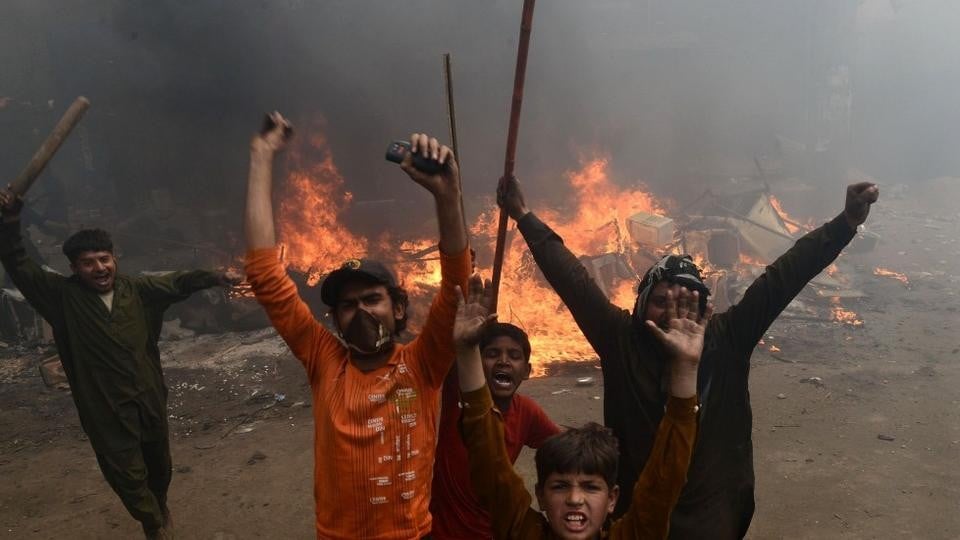

It was around 6pm on August 17 when Muhammad Zaheer saw something disturbing on his television screen. A skinny teenage boy wearing a black full sleeves t-shirt, his hands tied behind his back to a grill, pants down and being tortured. His face had been blurred. The news said a theft suspect was beaten to death by people in Bahadurabad.
"I suddenly became frightened because my son had worn the same t-shirt with the words: Apna Time Ayega (our time will come), written on it. He had gone to the same area yesterday," recalls Zaheer. "I called my brother first because Rehan had said that he was going to see chachu (uncle) in Dhoraji." Rehan had helped his uncle who worked as butcher for hire during Eid. "My brother said that he went out with friends yesterday after taking the money." Zaheer checked with his father who told them that Rehan had stayed at his place overnight and had left for home in the morning. "We went to the Jinnah Postgraduate Medical Centre mortuary. It was him."
Kokan Society, an affluent neighbourhood, where seventeen-year-old Rehan was killed over theft allegations is almost 6.5 kilometres away from his house in a densely populated and haphazard Lines Area, where finding a house by its number is labourious. Rehan has become well known in the area so much so that people can tell his house even from a distance. The house opens into a narrow lane where only two individuals can walk side by side. At the intersection of his house, the lane divides into two and a red coloured ladder-like staircase leads to a door on the upper portion.
"We have been living here for a little over a year," says Zaheer. "We lived for almost 22 years in Dhoraji." Rehan was well-acquainted with the streets of his former neighbourhood. He would go with his friends on motorcycle to see the bungalows around and they would sometimes sit on a hill in the area. "He was an ambitious kid. He just wanted to work hard to pursue his dreams."
Zaheer has seen the video of the torture his son endured. "He was pleading before his torturers to go with him and seek validation of his claim. He was no thief," says Zaheer. "The previous Eid, he and I had worked together at a bungalow nearby. The bungalow owners could also tell that Rehan was not such a person. But they did not listen and kept on torturing him and when my son fainted, they called the Rangers and handed him over."
Police took action and arrested Daniyal and Zubair after the Rangers reported the incident. They also found the video on the suspects with the help of which they have been able to arrest five people, allegedly involved in the incident. Police are still looking for other people involved in the incident. The Kokan neighbourhood is in constant fear. It is as if no one is talking about the incident, and no one wants to know about it.
"I wonder if someone tried to stop the boys from beating my son. Their families could have told them: Beta ab police ko de de, bahut maar lia (son, you have beaten him enough, now hand him over to the police)," says Zaheer as his voice trembles and eyes well up. Rehan was third in seven siblings. "His mother has hardly eaten since he died. When she is alone in the night, she cries. His brothers, his sisters, even the youngest one knows what happened to him."
Rehan had studied till the second grade because his family could not afford to pay his school fee any longer. He then started taking up odd jobs to make money for himself and his family. He had a liking for motorcycles, hip hop and rap music, and romantic movies. "Usually we - the poor - are afraid of dreaming big, but Rehan was unlike us. He wanted to live big and he worked hard to get what he wanted. On his insistence, I bought him a rickshaw on installments two weeks ago because he said he wanted to do his own work rather than work for others," says Zaheer.
Also read: The death drive
The family is seeking justice. Zaheer says he just wants the perpetrators to feel what he has gone through - if they can, at all. "I don’t know what to feel…maybe if they [families of the accused] had come to my place, had said the children have done this, and had shed some tears with me, maybe I would have had a different feeling. They did not even offer me a condolence through someone."
For now, Zaheer is anxious that the investigation officer of the case has been changed for the third time.